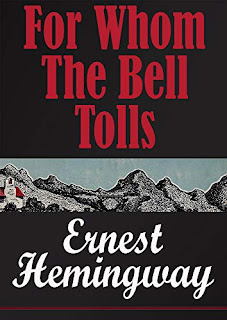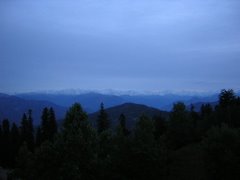I just finished this novel about the Spanish civil war. Hemingway has brought out the horrors of war in which peasants and international volunteers participate, besides the professional soldiers. A number of international volunteers join on the side of the republicans to fight against General Franco’s Fascism. Some of the volunteers are intellectuals and poets motivated by lofty ideals of freedom and democracy; Some are hardcore communists who are loyal to Soviet Union and speak the language of Comintern; and then there are peasants who do not understand any of the ideals for which the two sides are fighting. Who they support is decided by the simple need for survival. Some of them fight for the spoils. They are quick to strip the dead enemy’s clothes, boots and firearms.
In the villages, families settle old scores using the opportunity of the war. Since they do not have proper fire arms, they use sticks and stones. There is one gruesome scene in which the villagers line up the landlords and shop owners, beat them with clubs and throw the half dead victims over a cliff. Before the execution, the victims are allowed to pray in the local church. They emerge from the church door one and pass between the two rows of the drunken peasants who tease and taunt the victims before hitting them to kill. It is said that this is based on true stories.
The hero of the novel, Robert Jordan, is a professor of Spanish in a US university. He is one of those fired by idealism to join the Republican side. He develops a brotherhood with the others who are engaged in the Republican cause. Tasked with the job of blowing up a bridge, he goes about the job dispassionately and single mindedly. He knows that death could await him the next day but the danger does not make him flinch from the mission. While staying with the villagers who provide logistical support, he falls in love with Maria, an innocent young girl.
Hemingway has imbued the novel with the authentic Spanish characters who are peasants, bullfighters, gypsies, and guerilla fighters. He has used typical Spanish phrases and dialogues and given a flavor of the local culture. There are two characters who make a strong impression. One is Maria, the simple and uneducated rural girl who falls in love with Jordan. Orphaned and traumatized by the brutal killing of her parents by the Fascists, she is helpless and hopeless. She presents herself to Jordan with unconditional love, complete faith, obedience and surrender. She cannot even express her love and feelings, since she does not have the vocabulary. She does not even know how to kiss. She wants to be a wife but does not know all the duties of a wife. The love is just plain, pure and primal. There is no romance or flowers or poems. There is no talk of immortal love or 'I can't live without you' dialogue. Just a few glances, gestures and getting the bodies together in the sleeping bag in the night. The second character is Pilar, the older woman who sees through the men, with her long and rough experience. She speaks the language of survival, courage and pragmatism, going beyond emotions and sentiments. But she has an inner tenderness with which she takes care of Maria like a mother and encourages Jordan's love for Maria.
Hemingway portrays vividly the emotions running inside a bullfighter while facing the bull, the time before entering the ring and the feelings afterwards. A fearless hero in front of the charging bull is so afraid of bulls outside the ring. He cannot even bear to see the image of bulls in photos and decorations.
Hemingway wrote this novel not just on the basis of a writer’s imagination but based on his actual experience in the battlefield. This is evident in the intensity of play of emotions and the extensive minute details of the firearms. He was in the front lines as a war correspondent with sympathy and solidarity for the cause of the Republicans. It was while covering this war that he fell in love with Martha Gellhorn, another veteran American war correspondent and writer.
The only problem with the novel is that it is too long. It does not have a gripping story to sustain the length. I have read many longer novels and wished that they would not end. Not this one. One gets lost in the unending dialogues between the peasant characters and with the protagonist. Some of these conversations are meandering, meaningless and repetitive. One feels trapped too long in the forests of the Sierra de Guadarrama hills where the protagonist is staying to carry out his job of blowing up the bridge.
One small disappointment for me. I expected to see in the novel some Spanish poems and literary references. The Spanish civil was called as a "poets' war" since so many poets and writers from Spain and around the world participated on the Republican side and even recited poems in the front lines. Octavio Paz, Cesar Vallejo and Pablo Neruda from Latin America were among the famous poets who took part in the war against Fascism. The Spanish poet Federico Garcia Lorca was murdered by the fascists. The Spanish poetry of this period is so intense with the sufferings from the war. But Hemingway has decided not to touch the literary part of the war in this novel.



No comments:
Post a Comment